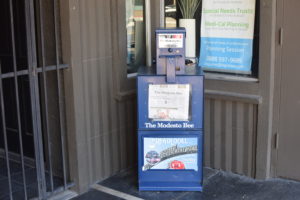Steve Ringhoff’s Modesto Explained presents local investigative journalism on a range of subjects. Here, Steve offers an insider’s look at the McClatchy corporation’s precarious debt load and what it might mean to the future of its newspapers. Reprinted with permission.

Do the 19 or so descendants of the founders of The McClatchy Company—whose media empire includes The Modesto Bee—feel the hot breath of a hedge fund wolf on the backs of their necks? Perhaps they should.
In addition to an existential threat at the boardroom level of the McClatchy Company at 21st and Q Streets in Sacramento, there are apparently major, recognized problems just getting the print edition to the dwindling subscribers. See Babette Wagner’s piece in The Valley Citizen of September 15, including the comments.
Our piece raises the question if, or maybe when, McClatchy’s financial position would trigger a default provision in one of their debt instruments causing debt-for-equity swaps, which would turn the hedge fund into the owner of McClatchy.
The hedge fund player is Anthony Melchoirre, a good friend of President Trump. He manages individual funds under the umbrella Chatham Asset Management of Chatham New Jersey. Chatham currently owns more than 20 percent of the publicly traded Class A common stock as well as about $700,000,000 in debt instruments.
Chatham has been in this kind of situation before. Twice. Both times it has ended up with majority interest in the companies in which it previously had minor interests. Both previous times involved media companies, although of a different stripe.
First, Chatham did a debt-for-equity swap to obtain more than a 60 percent interest in Postmedia Inc. the largest newspaper chain in the Great White North. Financial troubles provided the opportunity for Chatham to own this Canadian company.
Second, Chatham managed to convert a minority stock interest and debt in American Media Inc., a celebrity and lifestyle magazine publisher, into an 80 percent ownership of a parent limited liability company into which AMI was merged. Again, financial problems prompted the move. Until recently, AMI owned the National Enquirer.
McClatchy has not yet experienced the kind of financial difficulty experienced by Postmedia or AMI. Yet. But there are two red flags waving (figuratively) over McClatchy headquarters.
Pension Plan Waiver: McClatchy’s defined benefit plan, frozen in about 2009 and replaced with a 401k plan for most employees, has been underfunded for years. At last count the underfunding was somewhere north of $500,000,000. (There isn’t a missing decimal point…it’s half a billion dollars!)
Substantial contributions are due in the next year or so, money which McClatchy does not have in the bank, and for which earnings of that amount, net, are not foreseeable. So, they have asked the IRS for a waiver, not of the amount, but for payments to be spread out over time. The amount due is to be spread is said to be $120,000,000.
Making this request, in and of itself, is not a triggering event—one which would make the debt due now—but, in a SEC filing, McClatchy said if the waiver was not granted there would be “liquidity” problems. That’s like when your bar tab hits 20 and you only have a ten.
The term “liquidity problem” as it relates to McClatchy has been used by others. The Wall Street tout, The Street, reviewing McClatchy’s second quarter 2019 performance, says the company has “very weak liquidity.” Using its own methodology, TheStreet says it, “clearly shows a lack of ability to cover short term cash needs.”
There are three Chatham held debt instruments with different due dates and different interest rates. They are linked in default clauses so a default on one instrument triggers a required payoff on all three.
McClatchy owns 30 newspapers, including the Sacramento, Modesto and Fresno Bees. It also owns east coast papers in North Carolina and Florida. It does not publicly break down the earnings or costs by individual paper.
The company has been burdened by debt for many years and has used most of its earnings to pay on the debt, along with the sale of buildings housing its newspapers. It really has nothing else to sell to raise money should the debt be called.
When the company sold the Kansas City Star’s glass edifice, one local wag said: “they are turning the furniture into firewood.”
The Delisting Threat: Even if the IRS grants the waiver, present conditions represent another red flag. Last week the New York Stock Exchange (American) gave McClatchy notice it might be “de-listed,” absent a plan convincing the exchange it can reverse the slide reflected in four consecutive years of net losses and a negative shareholder equity of $372,500,000.

Until McClatchy comes back into compliance, the ticker symbol MNI will include “.BC” code for failure to meet the exchange’s standards. The plan is due within a month and may or may not be accepted by the exchange. Additionally, if accepted, the exchange will monitor compliance with the plan and could delist if progress is not made in accord with the plan.
We don’t know if delisting would be a default trigger or could prompt some sort of reorganization, either through bankruptcy or a voluntary arrangement as happened with Postmedia and AMI.
Chatham’s investments are called “thematic” as they have focused on media, magazine, newspaper and digital publications like the trio we have been discussing.
A little different, but within the theme is RR Donnelly, a marketing and printing company. Chatham had accumulated a10% interest by mid-August, according to SEC filings. We don’t know if Chatham holds a Donnelly debt.
So, what’s the worry? Well, here’s the potential problem: The McClatchy “family” losing effective control!
Years ago, McClatchy went public and sold shares in the company. There were two classes of shares. Class A shares are publicly traded. Class B are not. Class B was divided, for the most part, among heirs or descendants of those who founded the chain. While there were roughly the same number of Class A and B shares, there was a 10-1 vote disparity in favor of Class B. So, for example, if there were 500 shares of each, Class A would have 500 votes and Class B would have 5,000.
So, all things being equal the “family” would control the company. But what happens if more than $700,000,000 debt is now due? At today’s share prices, about $2.50, a debt for Class A equity swap isn’t going to put a dent in the debt.
So, to stay afloat, Class B shareholders may be required to pony up some or all of their stock, with a loss of control to naturally follow. Will the excellent journalism McClatchy now does continue without family control?
Bankruptcy might seem to be a solution but all of the Chatham debt is secured and all of the McClatchy subsidiary companies have signed on as guarantors of the debt.
Secured debt generally can’t be discharged in bankruptcy. And, there are few, if any, solid assets. Much of the balance sheet for McClatchy lists “goodwill” and “masthead value” as the primary assets. Masthead value is the newspaper’s name, subscriber and advertising list, and the website. The real property has, for the most part been sold or, in the past assigned to the pension plan in lieu of a cash contribution.
If, if, if Chatham took control it would only be rank speculation to talk about what philosophical changes might obtain. So, let’s do that.
When AMI owned the National Enquirer, it was run by David Pecker. He stands accused of arranging to pay two women to bury stories about alleged dalliances with then candidate Donald J. Trump. One was a former Playboy Playmate, the other a porn star. Pecker has been involved with management of both AMI and Postmedia.
Mr. Melchiorre pushed AMI to dump the Enquirer only after a threat to reveal sexts and below the waist selfies of Jeff Bezos. The Enquirer may have picked a fight with the wrong man. Bezos has sued and, being the richest man in the universe, he can bring the fight.
You have to wonder if the hedge fund would look beyond the bottom line. Again, any anticipated change in the philosophy of McClatchy is rank speculation.
Other changes are afoot, however.

The change in publication days for the Modesto Bee is not a red flag but simply the continuing effort to lose “legacy expenses”. The Bee will stop printing a Saturday paper but will not reduce the subscription price. The Bee promises to produce more robust Friday and Sunday editions, mentioning comics and crosswords. There has been no talk of adding reporters. Or, of a change in the focus for those still on staff.
Another headwind is the possibility that carriers will become employees under AB5 (the gig worker bill), signed by Governor Newsom recently. Right now, carriers are not exempt but enforcement for them has been delayed for one year. Newspaper publishers have called this threat existential.
Here’s a thought: One small chain of papers has made an agreement to have its papers delivered by someone who comes to your home every day—the postal carrier. The Ironton (Ohio) Tribune says its papers are on newsstands by 8 am every publication day (Tuesday through Saturday) and delivered to your home or office with that day’s mail.
Hmmmmmm.

Seems to me that Russia, China, Cuba, Venezuela, etc and McClatchy newspapers have a common agenda…and that is socialism. It simply does not work. If McClatchy had any sense they would have stopped leaning to the left years ago, but they continued to whip a dead horse. They did it while subscribers were swarming to the internet! Now they are paying the price. However, I fret for the Bee retirees as I fret for CalPers retirees… because California is going down the same dead-end road.
No doubt that McClatchy is off track financially. The frequency of VC articles on their struggling competitor reveals more about the reporter than the reported.
There is a broad news mix available in our community. Please be more interesting.
Socialism is not the problem for the Bee, as you allege, it’s the Internet. Papers throughout the country have closed down, gone to online-only or gotten really skinny, as the Bee has because of it. This has happened regardless of any political slant of the papers — right, left or otherwise.
Remember when classified advertising added a dozen pages or more to each paper? That was a major source of revenue for newspapers, but it’s been replaced by Craigslist and other free online resources. Former newspaper readers can get info from free online sites run by Associated Press or Reuters. Fewer readers mean less display advertising at lower rates for newspapers. The late, lamented Yellow Pages from the phone companies have experienced the same declines due to the Internet.
Complicating matters for the Bee and the employees’ pensions, the McClatchy Corp. made a HUGE blunder when they borrowed a big chunk of the $6.5 BILLION they paid to buy the Knight-Ridder newpapers in 2006. They did not foresee the broad Internet-driven decline in readership, which was significantly aggravated by the decline in advertising starting with the 2008 recession.
Not, it’s not socialism that has decimated the Bee and other papers of all political stripe around the nation, it’s the Internet-driven changes in where people get information. Quit looking through a political lens to see the facts around you.
When Mr. Wagner talks, people listen. He knows his economics.